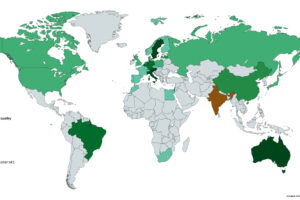In today’s world, the concept of vegetarianism has gained significant attention due to its potential health benefits and positive environmental impact. People choose vegetarianism for various reasons, including ethical concerns, health considerations, and environmental consciousness. However, one question that often arises is whether vegetarianism is more prevalent in urban or rural areas. In this article, we will explore the factors influencing vegetarianism and analyze its prevalence in both urban and rural settings.
1. Introduction
Vegetarianism is a dietary practice that involves abstaining from the consumption of meat and, in some cases, other animal products. It is a lifestyle choice that has been followed by individuals and communities for centuries. Today, vegetarianism has gained traction and is increasingly being adopted by people around the world.
2. Factors Influencing Vegetarianism
Several factors contribute to the decision to adopt a vegetarian lifestyle. Cultural and religious beliefs, availability of vegetarian options, and concerns about health and the environment all play a role in shaping an individual’s dietary choices.
Cultural and religious factors often influence people’s dietary preferences. Certain religions, such as Hinduism and Buddhism, promote vegetarianism as a way to practice compassion and non-violence. In such communities, vegetarianism may be more prevalent, regardless of whether they are in urban or rural areas.
The availability of vegetarian options also affects the prevalence of vegetarianism. Urban areas tend to have a wider variety of vegetarian-friendly restaurants, cafes, and supermarkets, making it easier for individuals to adopt a vegetarian diet. Rural areas, on the other hand, may have limited options, especially in regions where meat consumption is deeply ingrained in the local culture.
Health and environmental concerns are additional factors that contribute to the rise of vegetarianism. Many people choose a vegetarian diet for its potential health benefits, such as reduced risk of heart disease, obesity, and certain types of cancer. Moreover, the environmental impact of meat production, including deforestation, greenhouse gas emissions, and water pollution, has led individuals to embrace vegetarianism as a sustainable choice.
3. Vegetarianism in Urban Areas
Urban areas have witnessed a significant increase in the popularity of vegetarianism in recent years. The rise of plant-based restaurants and cafes catering to the growing demand for vegetarian and vegan options has played a crucial role. Urban dwellers have easier access to a wide range of vegetarian food choices, from plant-based burgers to dairy-free alternatives.
Furthermore, urban areas are often at the forefront of health and wellness trends. As awareness of the potential health benefits of a vegetarian diet spreads, more people are adopting this lifestyle. Urban dwellers tend to be more health-conscious and have greater access to information regarding nutrition and the benefits of vegetarianism.
4. Vegetarianism in Rural Areas
In rural areas, traditional dietary practices and cultural norms often shape the prevalence of vegetarianism. In agricultural communities, where farming and animal husbandry are central to the local economy, meat consumption may be deeply ingrained in the culture and lifestyle. As a result, vegetarianism may be less common in rural areas compared to urban centers.
Additionally, rural areas may face challenges in terms of the availability of vegetarian options. The limited variety of vegetarian ingredients and the absence of dedicated vegetarian establishments make it harder for individuals to embrace a vegetarian lifestyle. Reliance on locally sourced animal products, such as milk and eggs, may also contribute to a lower prevalence of vegetarianism in rural communities.
5. Challenges in Urban Vegetarianism
While vegetarianism has gained popularity in urban areas, there are still challenges that individuals face when adopting a meat-free lifestyle. One such challenge is the higher cost of vegetarian products. Plant-based alternatives and organic produce often come with a higher price tag, making it less affordable for some individuals, especially those with lower incomes.
Social pressures and cultural norms can also pose challenges for urban vegetarians. In many societies, meat is considered an essential component of meals, and individuals who choose a vegetarian diet may face skepticism or criticism from family, friends, or colleagues. Overcoming these social barriers requires a supportive environment and a shift in societal attitudes towards vegetarianism.
Moreover, urban areas may lack the necessary infrastructure to support a vegetarian lifestyle. While plant-based restaurants and vegetarian-friendly supermarkets are becoming more common, there are still regions where such establishments are scarce. Accessibility to affordable vegetarian options remains a concern, particularly in areas with limited resources or food deserts.
6. Challenges in Rural Vegetarianism
In rural areas, the challenges faced by individuals practicing vegetarianism differ from those in urban settings. Limited variety of vegetarian ingredients and a lack of awareness about alternative plant-based options can make it difficult for individuals to adopt a vegetarian diet. In remote rural communities, access to fresh produce may be limited, leading to a reliance on locally available animal products.
Cultural resistance to change can also hinder the prevalence of vegetarianism in rural areas. In some regions, meat consumption is deeply ingrained in cultural practices and traditions. Breaking away from these norms and embracing a vegetarian lifestyle may be met with resistance or skepticism from the community. Education and awareness campaigns can play a vital role in promoting the benefits of vegetarianism and dispelling misconceptions.
7. The Role of Education and Awareness
Education and awareness play a crucial role in promoting vegetarianism in both urban and rural areas. By educating individuals about the health benefits, environmental impact, and ethical considerations associated with vegetarianism, more people can make informed choices about their dietary habits.
Promoting vegetarianism through education can be done through schools, community programs, and online resources. Teaching individuals about plant-based nutrition, recipe ideas, and the positive impact of vegetarianism on personal health and the environment can inspire change and increase the prevalence of vegetarianism.
Addressing misconceptions and stereotypes surrounding vegetarianism is also important. Some people may have concerns about meeting their nutritional needs or believe that vegetarian diets are restrictive. Providing accurate information and highlighting the variety and abundance of vegetarian options can help dispel these misconceptions and encourage individuals to embrace a plant-based lifestyle.
Encouraging sustainable food choices is another aspect of promoting vegetarianism. By emphasizing the environmental impact of meat production and the benefits of reducing meat consumption, individuals can be motivated to adopt vegetarian practices. Supporting local farmers who practice sustainable agriculture and advocating for policies that promote vegetarian options can further contribute to a shift towards vegetarianism.
8. Conclusion
The prevalence of vegetarianism varies between urban and rural areas, influenced by factors such as cultural practices, availability of vegetarian options, and awareness about health and environmental benefits. While urban areas tend to have a higher prevalence of vegetarianism due to greater accessibility and awareness, rural areas face unique challenges related to traditional dietary practices and limited availability of vegetarian options.
Education, awareness, and the promotion of sustainable food choices play a crucial role in increasing the prevalence of vegetarianism in both urban and rural settings. By addressing social barriers, providing affordable vegetarian options, and dispelling misconceptions, more individuals can embrace vegetarianism and contribute to a healthier and more sustainable future.








